|
|
|
Sort Order |
|
|
|
Items / Page
|
|
|
|
|
|
|
| Srl | Item |
| 1 |
ID:
120772
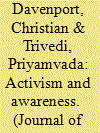

|
|
|
|
|
| Publication |
2013.
|
| Summary/Abstract |
There are a great number of outcomes for activism that are examined in the literature, but we know relatively little about how this behavior influences perceptions of the phenomena being challenged. It is possible that when one challenges some phenomenon, one begins to 'see' it more. Alternatively, activism might focus awareness on only certain manifestations of the problem of interest. The type of activism should matter here. We anticipate that only forms of resistance that increase exposure to oppression/oppressors and/or other challengers are likely to increase the number of discriminatory actions identified. Especially important here is nonviolent direct action because of the significant amount of training and interaction among activists that is facilitated by such activities as well as the extensive amount of exposure that nonviolence generally subjects participants to. Utilizing a unique database of 98,316 untouchables (or Dalits) from 1,589 rural villages in Gujarat, India, we find support for our argument. Specifically, Dalits who engaged in nonviolent action which increased either exposure to oppression/oppressors or exposure to other activists but not both, identified a higher number of discriminatory events. In short, some activism does activate some awareness. This has implications for dissident commitment, radicalization, and post-conflict political processes.
|
|
|
|
|
|
|
|
|
|
|
|
|
|
|
|
| 2 |
ID:
084004
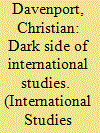

|
|
|
| 3 |
ID:
096197
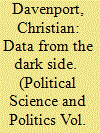

|
|
|
|
|
| Publication |
2010.
|
| Summary/Abstract |
I had interacted with professor Imari Obadele for quite some time at the National Conference of Black Political Scientists (NCOBPS). He is an elder scholar whom I knew had been politically active in the past but I was not aware of his specific affiliations or activities. At the time we first met, Obadele was only known to me as a political scientist at Prairie View. I had just begun my first job at the University of Houston a few years before. As there were not many elder black political scientists that I knew at the time, especially one interested in social movements and revolution, we immediately hit it off. It was not until a year or so after we first met and after I had published some research on the Black Panther Party (Davenport 1998a; Dahlerus and Davenport 1999; Davenport and Eads 2001), that we really started to interact.
|
|
|
|
|
|
|
|
|
|
|
|
|
|
|
|
| 4 |
ID:
053511
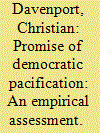

|
|
|
| 5 |
ID:
173208
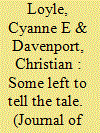

|
|
|
|
|
| Summary/Abstract |
Scholars of political violence often face problems concerning data availability. Research on the perpetrators of that violence is no exception. Over the past 40 years we have made great strides in understanding who joins in violent action and why, yet have rarely probed the representative nature of the subjects queried or contemplated the implications of this sampling for our conclusions. It is generally assumed that those left to ‘tell the tale’ about what transpired are representative of those who participated in the violence. In this article, we use the context of the 1994 genocide in Rwanda to probe questions about which perpetrators of violence we include in our research and subsequently, who we miss. We theorize an often overlooked group of perpetrators, the ‘murderers in the middle’, who take orders from above, mobilize others to kill, and zealously participate themselves. We contend that this group of perpetrators is potentially unique from those generally captured, identified, and studied in that they are likely to have actively and willingly engaged in violence for personal gain as well as for ideological reasons. Systematically missing groups of perpetrators has potential implications for research on participation in mass violence as well as our understanding of why this behavior occurs.
|
|
|
|
|
|
|
|
|
|
|
|
|
|
|
|
| 6 |
ID:
114676
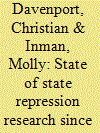

|
|
|
|
|
| Publication |
2012.
|
| Summary/Abstract |
Researchers have been exploring government repressive behavior for decades, but the greatest improvements have come in the last two. For example, greater theoretical specification has allowed us to determine a great deal about what repression is and why it occurs, while greater methodological sophistication has allowed us to test these theories rigorously. Despite or rather because of these advancements, however, we know comparatively little about what impact repression has on other social, economic, and political phenomena. This article reviews our general knowledge of the topic and attempts to improve our understanding of how repressive action influences behavioral challenges to governments.
|
|
|
|
|
|
|
|
|
|
|
|
|
|
|
|
| 7 |
ID:
078641
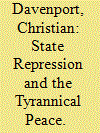

|
|
|
|
|
| Publication |
2007.
|
| Summary/Abstract |
Existing literature on state repression generally ignores the diversity that exists within autocracies. At present, different political systems are collapsed together, leaving unique approaches to political order unexamined. This limitation is important for policymakers, activists, and everyday citizens around the world seeking new ways to reduce government coercion. Within this study, the author explores an alternative path to decreasing repression - a `tyrannical peace'. Examining 137 countries from 1976 to 1996, he finds that single-party regimes are generally less repressive than other autocracies. Results also show that military governments decrease civil liberties restriction and the end of the Cold War has varied influences on repression, depending upon the form considered and whether this variable is interacted with another. There are thus alternative routes to peace, but these routes are not equally robust. The implications of this analysis are threefold. First, those interested in understanding why states restrict civil liberties and violate human rights must disaggregate their conceptions of system type and repression. Second, policymakers must adjust their approach to reducing state repression according to the type of authoritarian government they are confronted with. Third, advocates for human rights must accept that, in lieu of full democratization, alternatives exist.
|
|
|
|
|
|
|
|
|
|
|
|
|
|
|
|
| 8 |
ID:
187550
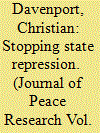

|
|
|
|
|
| Summary/Abstract |
While research into why repression/human rights violation goes up or down has thrived over the past 50 years, essentially no effort has been made to examine what stops this behavior once under way – especially activity that is large-scale as well as violent. To address this topic, we put forward the idea of a repressive spell (similar to that in the study of war, civil war, and terrorism) and a new theoretical framework that conceptualizes repression as a sticky process that is unlikely to terminate unless it is disturbed in some manner. Such an orientation is important because it leads us to conclude that disturbance is more likely to happen under situations of democratization compared to any of the factors typically highlighted in the literature and relevant policy community. Investigating a new database regarding 239 large-scale repression spells from 1976 to 2006, we find that democratization is associated with spell-termination and there is little systematic pacifying influence from anything else. Additionally, we find that nonviolent movements for change principally drive democratization but that these movements have little direct impact on state repression spells in and of themselves.
|
|
|
|
|
|
|
|
|
|
|
|
|
|
|
|
| 9 |
ID:
059684
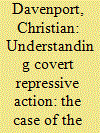

|
|
|
|
|
|
|
|